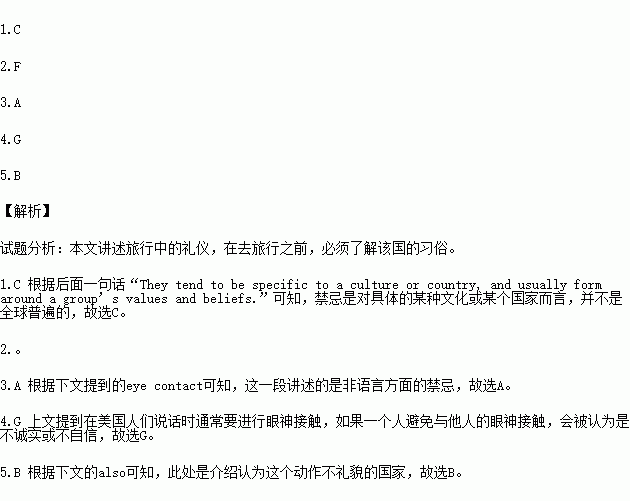题目内容
根据短文内容,从短文后的选项中选出能填入空白处的最佳选项,选项中有两项为多余选项。
Every culture has its own unwritten list of behavior that is acceptable. Every society also has its taboos, or types of behavior that are considered a violation (违反) of good manners.
The word “taboo” comes from the Tongan language and is used in modern English to describe verbal and nonverbal behavior that is forbidden or to be avoided. 1. They tend to be specific to a culture or country, and usually form around a group’s values and beliefs. What is considered acceptable behavior in one country may be a serious taboo in another.
Verbal taboos usually involve topics that people believe are too private to talk about publicly, or relate to one’s manner of speaking. In many cultures, for example, it is considered bad manners to discuss subjects such as sex or religion in public. In some countries, the volume (音量) of one’s voice may annoy people. 2.
3. For example, one of the biggest differences among many Western, Asian, and African cultures is the use of eye contact. In the US, people make eye contact when they talk to others. 4. In many Asian and African cultures, however, children are taught to lower their eyes when talking to their elders, or those of higher rank, as a way to show respect.
Certain gestures made with the hands can have very different meanings depending on the country you are in. Crossing your middle finger over your forefinger is the sign for good luck in many western countries. 5. Also, in some Asian countries, moving your hands a lot while talking, or ‘talking with your hands’, is considered unsuitable.
Behavior that is acceptable and non-offensive in one culture can be highly offensive in another. When visiting a foreign country, be aware of some of the basic differences, as this will help to ensure a more enjoyable trip.
A. Nonverbal taboos usually relate to body language.
B. In Vietnam and Argentina, however, it is a rude gesture.
C. In spite of what some people may think, taboos are not universal.
D. Cancer is a taboo subject and people are frightened to talk openly about it.
E. Learn a country’s customs so that you don’t hurt the local people unconsciously.
F. They might think that someone who is speaking or laughing loudly is rude or aggressive.
G. If a person avoids eye contact, others might think he is being dishonest or unconfident.

